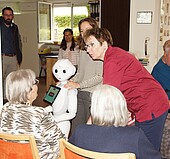As part of a new study in the Department of Social and Health Care, the use of the humanoid robot "Pepper" in day care is being evaluated under the direction of Prof. Dr. Esther Berkemer, Chair of Nursing Science. The aim is to investigate the acceptance and user-friendliness from the perspective of the day guests and caregivers.
The integration of new technologies, in particular humanoid robots, represents an innovative and promising option for integrating activating and social-emotional services into the everyday lives of people in need of care and clarifying the benefits of such support and the potential relief for caregivers in everyday life.
The study is intended to provide important insights into which factors improve the quality of life of day guests and how the use of a humanoid robot can be designed in a person-centered way in day care. It focuses on two central areas:
Attitudes and expectations of day guests and caregivers towards humanoid robots:
This includes assessing their perceptions about the use of robots in care, their concerns and hopes about the technology, and their general openness to new care practices.
Acceptance and user-friendliness:
How well do the day guests accept Pepper? What interactions promote a positive user experience and how can the robot contribute to cognitive and socio-emotional support?
How helpful is Pepper in the daily work of caregivers and what are the limitations of using Pepper? Which functions are perceived as particularly useful and how can the use of the robot be optimized?
Based on the experiences and feedback, recommendations for the further design and improvement of the robot technology will be developed in order to meet the needs of all those involved.
The study is being carried out at the SENTA day care facility in Ludwigshafen and includes both qualitative and quantitative surveys. The results should provide recommendations for the successful use of humanoid robots in the care sector and help to support the implementation of this technology in practice.
Further information on the study and the results will be published in the coming months.
Background:
The study outlined here is part of the interdisciplinary project "Humanoid Robots: Sustainable Acceptance and Use in Care and Consumption", led by Prof. Dr. Esther Berkemer and Prof. Dr. Gerhard Raab and funded by the HAW-direkt program of the Ministry of Science and Health Rhineland-Palatinate.
The humanoid robot Pepper is part of the equipment of the behavioral science research laboratory of the HWG LU and has already been used in the Wilhelm-Hack Museum or at this year's film festival on Parkinsel as part of the project in addition to the "SENTA" day care facility in Ludwigshafen.
Specialist contact:
Ludwigshafen University of Business and Society
Department of Social and Health Care
Prof. Dr. Esther Berkemer
Professorship for Nursing Science
E-mail: esther.berkemer@ 8< SPAM protection, please remove >8 hwg-lu.de





